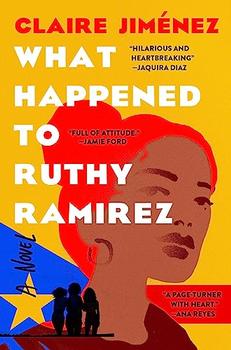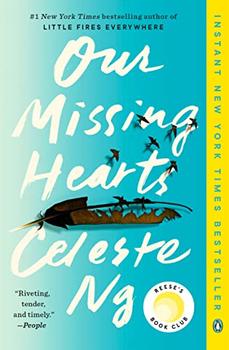Summary | Excerpt | Reading Guide | Reviews | Beyond the book | Read-Alikes | Genres & Themes | Author Bio

Prizewinning author Patricia Engel explores themes of family separation and immigration in her new novel Infinite Country. Fifteen-year-old Talia has grown up with her maternal grandmother Perla and her father Mauro in Bogotá, Colombia, while Talia's siblings and mother Elena live in New Jersey. This emotional territory is likely to resonate with anyone who has been separated from loved ones.
Settings and characters are vividly portrayed, pulling readers into the complex and suspenseful dynamics of a contemporary family torn apart by circumstances beyond their control. Engel, whose parents were born in Colombia, flavors the text with occasional Spanish words and writing that is poetic in its tone and imagery. In one scene, Talia escapes from a juvenile detention facility by hitching a ride on a motorcycle with a teen boy, Aguja:
Aguja pulled into a gas station and as he fueled up, they listened to a pair of viejos at another pump arguing about the peace accord ... One man in a sombrero vueltiao, face shriveled as old fruit, said the guerrillas would never abandon the monte or their criminal activity, that they were made only for battle. The other man, wishbone-legged, insisted that if only to end the massacres of the last decades, a meager treaty was better than none at all.
In passages like these, the author layers particular teens at risk with larger dangers that surround them. In early 21st-century Colombia, citizens struggle for peace and economic stability in the wake of decades of violence driven by paramilitary groups and narco-traffic. Meanwhile, in the United States, fears of terrorism propel new waves of prejudice against immigrants.
Engel also probes the history of the Americas before European conquest. In the Andean highlands around Bogotá, the civilization known as the Muisca (see Beyond the Book) developed rich traditions and ties to nature that endure to the present day. The author's choice to weave Muisca stories into the contemporary narrative propels an argument that indigenous ways hold enduring value. Talia's grandmother Perla relies on traditional medicine and rituals. No ritual is strong enough to protect the granddaughter from her own destiny, her own mistakes and choices, but through stories of the ancient ancestors, Perla and Mauro create layers of spiritual protection; when Talia journeys alone, she will recall their wisdom in times of challenge.
By engaging elements of indigenous myth, the author makes a case for the notion that human civilization is much wider and deeper than current political borders describe. Mauro takes his family to a sacred lake, Guatavita, said to be the site of the myth of El Dorado—the story of a lost city of gold—because of an indigenous ritual where the ancient chiefs offered gold ornaments to the lake: "The real reason Mauro brought his family to the supposed holy place … the Muisca believed gold to be the sun's warmth and power incarnate; if a person harnessed it, one could make their own magic."
The narrative jumps around in time to explore backstory, including the romantic courtship of Talia's parents. They fall in love during the calamitous early 1990s, when narco-boss Pablo Escobar is in power. The unreliable economy of Colombia and multiple dangers of life in Bogotá prompt the couple to visit the US on tourist visas with their infant daughter Karina. They find work, overstay their visas and soon have two American-born children, Nando and Talia. Complications of identity intensify when Mauro is deported and Elena remains stateside to earn money to support her mother back in Colombia. Through a complex reckoning, infant Talia is sent to live with grandmother Perla so that Elena can work longer hours. This story may sound familiar because thousands—actually, millions—of people are affected by the pressures driving global migration, which often lead to some form of separation. This novel, focused on parents unable to cross the border legally and siblings coming of age in mixed-status families, is an important addition to immigration literature.
People cross borders seeking a better life. Family separation and reunification is complicated. In this historic moment, humans everywhere struggle to redefine "home," "family" and "community." Books like Infinite Country help light the way.
![]() This review was originally published in The BookBrowse Review in March 2021, and has been updated for the
October 2021 edition.
Click here to go to this issue.
This review was originally published in The BookBrowse Review in March 2021, and has been updated for the
October 2021 edition.
Click here to go to this issue.

If you liked Infinite Country, try these:

What Happened to Ruthy Ramirez
by Claire Jimenez
Published 2024
A powerful debut novel that's "hilarious, heartbreaking, and a**-kicking" (Jamie Ford), of a Puerto Rican family in Staten Island who discovers their long‑missing sister is potentially alive and cast on a reality TV show, and they set out to bring her home.

by Celeste Ng
Published 2023
From the #1 bestselling author of Little Fires Everywhere, comes one of the most highly anticipated books of the year – the inspiring new novel about a mother's unbreakable love in a world consumed by fear.
Your guide toexceptional books
BookBrowse seeks out and recommends the best in contemporary fiction and nonfiction—books that not only engage and entertain but also deepen our understanding of ourselves and the world around us.